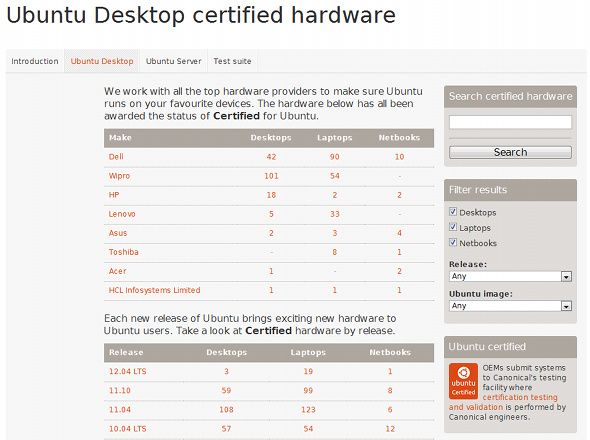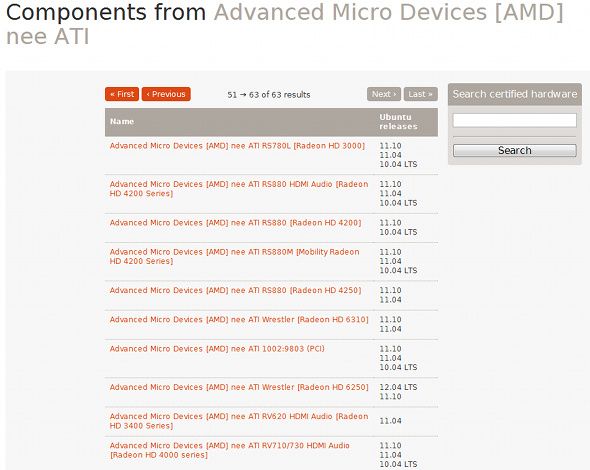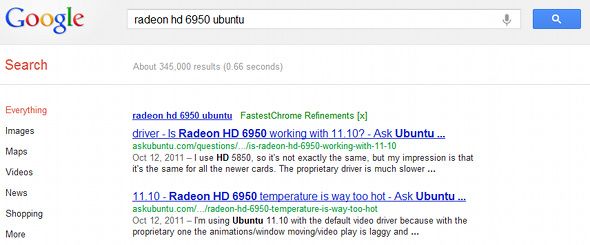If you've ever used Linux, you've probably noticed that a lot of hardware works straight out of the box, no questions asked. No motherboard drivers need to be installed, no ethernet drivers, in most cases no wireless drivers, and not even graphics drivers (depending on your stance on open source vs. proprietary). In this sense, Linux definitely offers a plug-and-play experience above Windows, and (as far as I know) it challenges Mac OS X's capabilities as well.
However, no operating system will have support for every single piece of hardware out of the box, and it's important to know which ones have that support. There's always a driver for that piece of Windows hardware, but with Linux, you do not have that guarantee, so the overall hardware support (including additional drivers you can download) is smaller.
You can figure out, however, which pieces of hardware do have Linux support by checking hardware databases.
Ubuntu Certified
Ubuntu, one of the most popular Linux distributions, has enough commercial backing to make some things happen with OEMs. The result is simple - OEMs and Canonical (the company that backs Ubuntu) can work together to offer desktops, laptops, netbooks, and servers that are 100% guaranteed to work with Ubuntu, no questions asked. These systems that are extensively tested and are proven to work get Canonical's "Ubuntu Certified" label.
You can find out what those systems are by going to this page for the list of "Ubuntu Certified" computers.
Ubuntu Components List
I'm cheating just a little bit, but Ubuntu also has another resource for those who don't already have an "Ubuntu Certified" computer. If you'd rather look for specific parts, you can look at Ubuntu's component catalog and see if it is part of the list. If so, it'll also tell you the oldest release that has support for it (by running the latest version you should not have to worry about support as long as it appears on the list).
Please remember that the list is not entirely inclusive, and similar products will probably have support as well (for example, if say the list included the AMD Radeon HD 6950, it will most likely support the AMD Radeon HD 6970 as well).
Also, if you know a thing of two about hardware, try to use a little geek common sense. Bluetooth headsets should work just fine provided your system has Bluetooth capabilities, and basic keyboards should do the same, no matter what model. Video cards (except maybe the bleeding edge ones) should also work no matter what type of driver you settle with.
Linux-Drivers.org Compatibility Lists
Last but not least, we always need an outside source other than Ubuntu. While hardware supported on one distribution will most likely be supported on all other distributions, it's best to check other sources that may claim Linux support for certain hardware that other lists simply left out. Linux-Drivers is a great resource which doesn't provide its own list but links to many different lists that are specialized in some fashion.
You can then look at specific laptop hardware, specific distributions, video cards, and much more. If you find your hardware in any of those lists, there's a high chance it'll work.
Use Google As A Last Resort
Last but not least, use Google. This is probably the cheesiest tip I can offer, but it does help a lot. If you can find your hardware in any of the lists I've mentioned, you can always do a Google search such as "radeon 6950 linux" or "radeon 6950 ubuntu", depending if you want to be generic or distribution specific. Most likely, you'll come across a forum thread that will discuss your piece of hardware and its support status.
If you still cannot find your piece of hardware, maybe you should get something else as it seems there is virtually no support for it from anyone.
Conclusion
Hopefully you'll be better informed before you go out and buy a piece of hardware, knowing whether or not it will work properly under Linux. I personally haven't had to check often before I go and buy something, but it's always good to be sure, especially if you're not as knowledgeable about hardware. Just don't forget to enjoy Linux when everything runs smoothly.
What kind of hardware issues have you experienced with Linux? How did you fix them? Let us know in the comments!
Image Credit: lastquest





